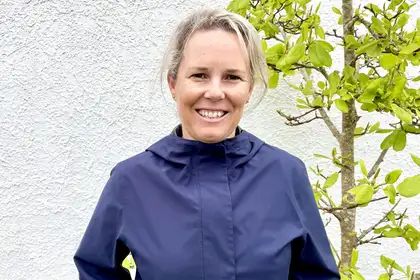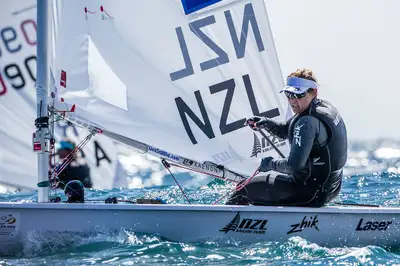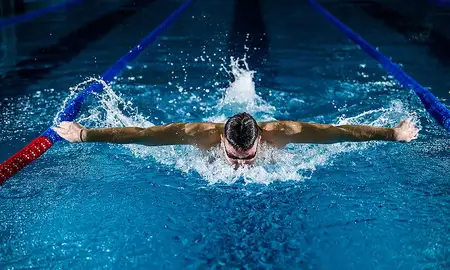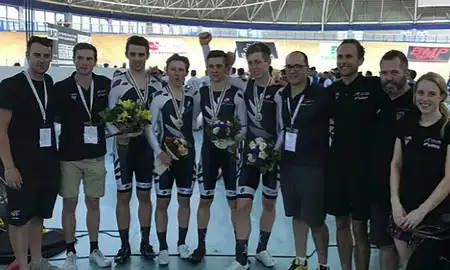
Master's student and former Olympian Sara Winther.
The study intends to explore what elite athletes find stressful in their day-to-day lives and how this relates to their mood. It will examine the relationship between stress and mood, and whether some groups of athletes are more at risk of encountering higher levels of stress or experiencing mood disorders than others.
This body of work, commissioned by HPSNZ, intends to replicate previous research carried out by Dr Sarah Beable in 2015. Athletes from the same 14 sports previously studied have been invited to participate. Sara says she’s looking forward to seeing what changes have taken place in the mental wellbeing space for elite athletes over the last seven years.
“Since the original study in 2015, awareness around the turbulent life of an athlete has grown significantly. There have been many instances of well-known athletes speaking out on issues of mental health which has promoted much research to support this. It’s great to revisit this space and provide an opportunity for athletes to have a voice that’s anonymous but heard. I feel fortunate to be taking on this study in an area I’m so passionate about and to do so under the wonderful guidance of my lead supervisor, Dr Ian de Terte, and Dr Warrick Wood. I also get to work alongside some of New Zealand’s leading high performance sport experts like Dr Bruce Hamilton, Dr Kylie Wilson, and original researcher Dr Sarah Beable.”
Sara will be analysing the data received from an online survey completed by participating athletes. The results are anticipated to highlight areas where adjustment is needed in the current mental health strategy, and identify any gaps in the support services offered to athletes.
She says she is driven in this line of research by wanting to help athletes have a holistic approach to their sporting endeavours.
“I believe an athlete will be a far better sportsperson when the approach is holistic. While at times sport may have to be the priority, athletes can have multiple goals and interests across all areas of life. This creates an identity outside of being an athlete, which helps with being an athlete – it’s circular. It also helps with the transition away from sport, which we know can be a difficult period for athletes to manage.”

Sara still gets out on the water to take a break from study.
Sara’s keen interest in this area developed from experiences in her own sporting career and that of her peers. In 2009, after undertaking a Bachelor of Business Studies with Massey, Sara committed herself full-time to her goal of sailing in the 2012 Olympics. After not reaching the outcome she’d hoped for, she trained for the 2016 Rio Olympics. Despite being close to making the criteria, she wasn’t selected, which she says was a hard pill to swallow at the time.
Sara still went to the 2016 Olympics, not as an athlete, but to support her friend and fellow sailor Annalise Murphy.
“Annalise was a great sailor, but at the time she was experiencing a slump in performance and motivation. I had a complementary skill set to her and was able to help her prepare over a hugely productive six weeks. I went to the Olympics as part of her support team and witnessed a huge turnaround in her mindset. Annalise went on to win the silver medal, the first ever female sailing medal for Ireland.”
Being a part of Annalise’s journey sparked Sara’s curiosity to pursue a career in performance psychology and train to become a registered psychologist. Sara was keen to return to Massey as she knew she could study extramurally and part-time, which allowed her to coach Hungarian athlete Maria Erdi for the 2020 Olympics at the same time.
“Even before COVID, Massey offered me the flexibility to be out of New Zealand. Since COVID, this got even easier. I’ve had some great course coordinators who have supported my coaching and being overseas looking after athletes while completing my papers.”
Sara says that through her study journey and living through her own transition away from being an athlete, she has a real interest in mental wellbeing.
“I’ve come to see you cannot have performance without wellbeing – they are inextricably tied. I’m motivated to help athletes achieve that balance and believe not only that their sporting performances will improve, but their enjoyment of what they’re doing will as well. Sport and physical activity can play a significant role in an individual’s mental health, and having athletes model these benefits can be a huge asset to a sporting mad country like New Zealand.”
When Sara’s not studying, she still gets out to sail. She now races as a team on an MRX Keelboat and has won two Women’s Keelboat Nationals. Sara is also a fan of road cycling and cycles most mornings with a group of local women. Sara is also a helpline volunteer for Anxiety NZ and says she enjoys helping people through this role.
Related news
The mental pressure faced by professional athletes
With our Kiwi Paralympians now on the world stage and a record medal haul at the Olympics for the New Zealand team, the mental challenges and pressures facing athletes in the current COVID-19 world has been thrown in the spotlight.

Keeping cyclists’ minds on track
Warrick Wood has recently returned from Italy, where he was working with the U19 New Zealand Track Cycling Team, as mental skills coach.
